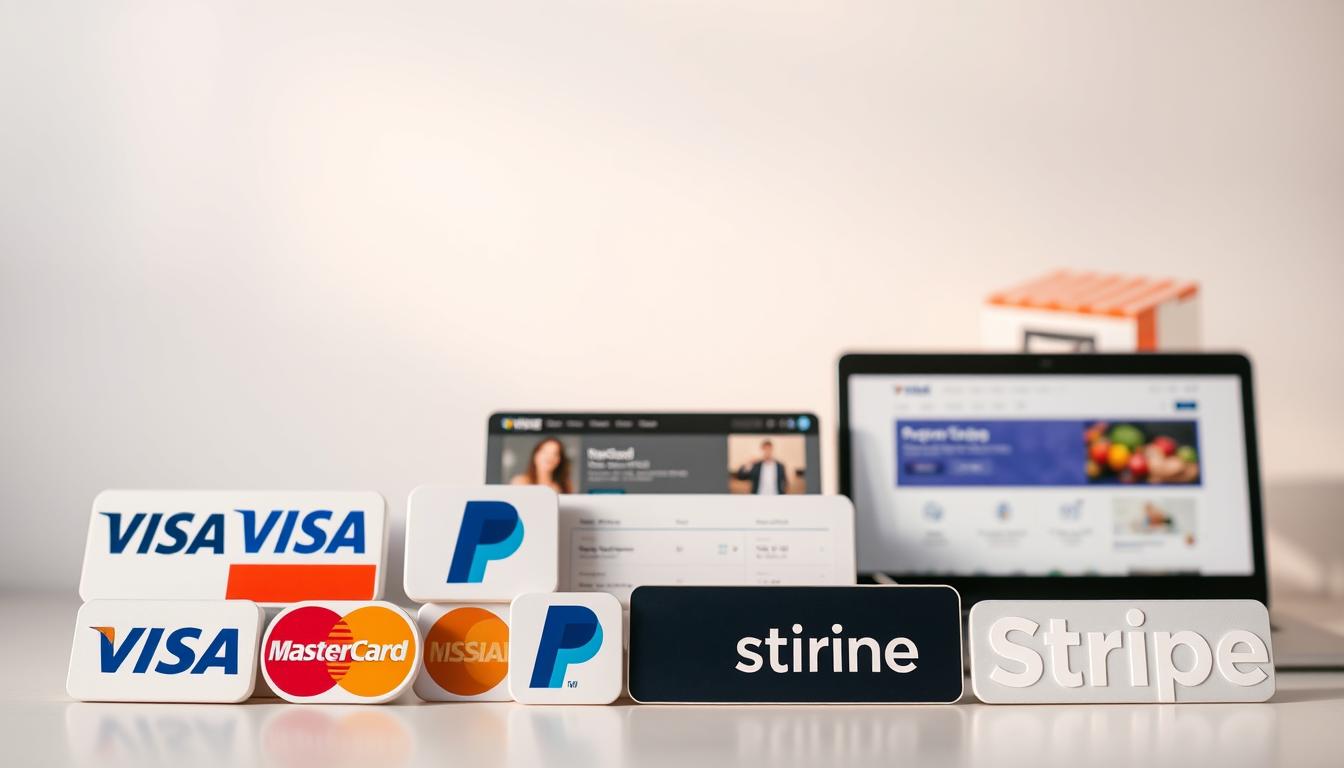Did you know the global e-commerce payments market is set to hit $37.59 billion by 2025? It’s growing at a fast 17.3% CAGR. Small e-commerce businesses need to pick the best payment gateways to stay ahead. These gateways connect customers with merchants, making sure payments are safe and smooth.
When you’re in the digital commerce world, finding reliable payment solutions is key. Knowing what each gateway offers in terms of features, fees, and security is important. This helps you create the best payment plan for your business. Check out the best payment gateways here to get your business ready for success.
Key Takeaways
- Payment gateways are essential for enabling secure transactions in e-commerce.
- Choosing the right payment processing solution can enhance customer satisfaction.
- Understanding transaction fees is vital for budgeting and pricing strategies.
- Look for gateways that offer seamless integration with your e-commerce platform.
- Prioritize security features to protect sensitive customer data.
- Research various options to find the best fit for your unique business model.
Understanding Payment Gateways and Their Importance
In today’s digital world, knowing about payment gateways is key for e-commerce sites. They connect customers with merchants, making online payments safe and easy. These systems keep customer and merchant data safe by encrypting it during transactions. Learning about payment gateways and their features can boost your business’s efficiency and security.
What is a Payment Gateway?
A payment gateway is a tech tool that handles online payments. It moves info between a payment site (like a website) and a bank. This tech is vital for keeping transactions safe. It encrypts payment details and checks with the bank for approval.
This ensures customers’ safety and builds trust in your payment options.
How Payment Gateways Work
Understanding how payment gateways work is important. When a customer buys something, the gateway encrypts their payment info. It then sends this info to the payment processor for a check.
The processor checks if the customer has enough money and approves the payment. This smooth process makes online payments easy for users.
Key Features to Look For
When picking a payment gateway, look for these key features:
- Built-in fraud detection: This helps spot and stop fake transactions.
- Compliance with PCI standards: This means the gateway meets strict security rules, keeping customer info safe.
- Ease of integration: A simple setup process is great for quick integration with popular e-commerce sites.
- Multi-currency support: This lets businesses accept payments in many currencies, reaching more customers worldwide.
Top Payment Gateways for Small E-Commerce
Finding the right payment gateway is key for small e-commerce businesses. They need easy payment processing and secure transactions. Here are three top choices that meet different needs and preferences.
PayPal: A Popular Choice
PayPal is a trusted choice for small businesses. It has no setup fees, making it easy to start accepting payments. Its global reach helps businesses tap into a large customer base.
The one-click checkout feature makes transactions simple and fast. This improves the user experience.
Stripe: Flexibility and Developer-Friendly
Stripe is known for its flexibility, especially for developers. It offers a user-friendly interface. This platform is great for subscription models and provides advanced analytics.
Stripe prioritizes security, ensuring all transactions are safe. This makes it a reliable choice for businesses.
Square: Comprehensive Payment Solutions
Square offers a complete payment solution for both online and in-person sales. It’s perfect for small and medium-sized businesses. Square’s efficient inventory management and reliable customer support stand out.
With low setup costs and strong security, Square is a top choice for various payment needs.
| Payment Gateway | Setup Fees | Main Features | Security Features |
|---|---|---|---|
| PayPal | No | Global reach, one-click checkout | SSL encryption, fraud protection |
| Stripe | No | Subscription models, advanced analytics | Tokenization, PCI compliance |
| Square | No | Inventory management, customer support | End-to-end encryption |
How to Choose the Right Payment Gateway
Choosing the right payment gateway is a big decision. It depends on your business’s unique needs. You should think about how easy it is to integrate with your e-commerce platform. Also, consider the payment methods your customers like and the support you’ll get from the provider.
Factors to Consider
When looking at payment gateways, focus on these key points:
- Transaction Fees: Check both flat rates and percentage fees.
- Supported Payment Methods: Make sure it accepts various payments like credit cards and digital wallets.
- Security Measures: Look for strong security like encryption and fraud tools.
- Integration: Easy integration with platforms like Shopify and WooCommerce is important.
Your Business Model’s Impact
Your business type affects what you need in a payment gateway. For example, subscription services need recurring billing. International sellers need global transaction features. Always match the gateway to your business needs.
Transaction Fees and Costs
Understanding transaction fees is key for budgeting. Fees vary a lot between providers. Look at options like Stripe for competitive fees or Shopify’s fees for different methods. Make sure these costs fit your business budget.
Security Features of Payment Gateways
Keeping customer data and transactions safe is key for online shops. Payment gateways have many security features to help with this. It’s important for businesses to know about these features when they handle digital payments.
Importance of Encryption
Encryption is crucial for keeping data safe during online transactions. It turns data into a code that only the right people can read. This stops hackers from getting into the system and keeps customer info safe.
Fraud Detection and Prevention
Payment gateways like PayPal and Stripe use smart fraud detection. They use machine learning to watch for and stop suspicious activity. This helps online shops keep their customers’ trust by reducing fraud risks.
Compliance with PCI Standards
Following the Payment Card Industry Data Security Standard (PCI DSS) is essential for businesses that handle card info. These standards help keep customer data safe. By following PCI, businesses can ensure secure transactions and protect against fraud and data breaches.
Integration with E-Commerce Platforms
How well a payment gateway works with e-commerce platforms is key for businesses. They use platforms like Shopify, WooCommerce, and Magento to run their online stores. A good payment gateway makes sure payments go through smoothly, giving a great experience for everyone.
Compatibility with Shopify
Shopify works with many payment gateways, like PayPal and Stripe. These gateways have easy-to-use plugins for setting up payments. Shopify’s app store helps merchants find the right payment solution for them.
WooCommerce Integration Options
WooCommerce supports many payment gateways, from simple ones like Stripe to more complex ones. Making sure WooCommerce works well with your payment gateway makes things easier for you. You can also look into payment processing automation tools to improve your workflow.
Magento and Payment Gateway Choices
Magento has lots of payment gateway options, including Authorize.Net. Each gateway has its own features, so it’s important to pick the right one. Knowing how payment gateways work can really help your business run better.
User Experience and Customer Support
Adding a payment gateway is more than just making transactions safe. It’s about making sure users have a good experience and getting help when they need it. Payment gateways with easy-to-use interfaces help customers pay without hassle. For example, Square’s designs make transactions smooth, making users happy.
Importance of User-Friendly Interfaces
User-friendly interfaces are key in how customers interact with payment gateways. When it’s easy to pay, people are more likely to buy. Simple designs and clear steps help avoid confusion, leading to more sales. Companies that focus on this see more loyal customers.
Customer Support Options Available
Having good customer support is crucial for a great user experience. Payment gateways with 24/7 support help businesses fix problems fast. This builds trust and satisfaction, as users know they can count on help when needed.
Reviews and Ratings Analysis
Looking at reviews and ratings gives insights into payment gateways. Sites like Capterra share feedback on payment solutions and support. This helps businesses choose a gateway that meets their needs, focusing on ease of use and support.
Payment Gateway Alternatives for Niche Markets
E-commerce is growing, and niche markets are popping up everywhere. Each one has its own payment needs. Businesses need to think about alternative payment options to draw in specific customers. This part looks at how digital payments are changing in different areas, like cryptocurrency, subscription services, and flexible payments.
Cryptocurrency Payment Options
Cryptocurrency payment gateways are becoming more popular. They attract customers who like digital money. With platforms like BitPay or Coinbase Commerce, businesses can make transactions faster and cheaper. They also ensure payments are safe and clear.
Solutions for Subscription-Based Businesses
Payment gateways for subscription services make billing easy. Tools like Chargebee or Recurly help manage subscriptions well. This is key for SaaS companies and digital content providers who need a solid payment system.
Pay-As-You-Go Models
For small businesses, pay-as-you-go models are a great choice. They don’t have to pay a fixed monthly fee. With Square, businesses only pay for what they use. This makes starting up easier and encourages growth.
These different options show the need for custom solutions. Businesses can look into various alternative payment options that fit their needs and what their customers want. This helps them grow in today’s digital world.
International Payments and Currency Conversion
Expanding into international markets can really boost e-commerce businesses. Being able to handle international payments well is key to success. Payment gateways that support multiple currencies make shopping easier for customers all over the world.
Multi-Currency Support Features
Multi-currency support lets businesses take payments from anywhere. It helps customers see prices in their own currency. Payment gateways like PayPal and Stripe make this process smooth, which builds trust and boosts sales.
Handling Currency Conversions
Businesses need to know how currency conversions work. Payment gateways charge a fee for this, and the cost can change. Keeping an eye on these fees helps businesses stay competitive.
Implications for Global Sales
Going global can open up new sales channels, but it comes with its own set of challenges. Transaction fees and changing exchange rates can impact profits. Knowing these risks helps businesses succeed in the global market.
Common Challenges in Payment Processing
Payment processing is key for e-commerce success. Yet, it comes with challenges for both merchants and customers. Overcoming these hurdles can make transactions smoother and enhance user experience.
Dealing with Chargebacks
Chargebacks can hurt merchants financially and threaten their accounts. They happen when customers reverse a transaction, often due to fraud or product dissatisfaction. Clear communication and detailed product descriptions can lower chargeback rates.
Payment Declines and Their Causes
Payment declines can upset customers and are caused by many things. These include expired cards, not enough funds, or processing limits. Businesses should clearly explain these issues to customers and help solve them. Knowing why declines happen helps improve the payment process.
Navigating Currency Exchange Rates
International sales often involve currency exchange, affecting profits. Exchange rate changes can cause unexpected costs for both sides. A good currency exchange solution can reduce risks and ensure fair pricing. Understanding these factors is key for global payment success.

Future Trends in Payment Gateways
The world of payment gateways is always changing. New tech and what people want are driving these changes. Small online shops need to keep up to meet customer needs.
Contactless payments are becoming more popular. People like quick and easy checkout. This makes shopping faster and more enjoyable.
The Rise of Contactless Payments
Contactless payments are changing how we pay. You just tap a card or phone to pay. It’s fast and safe.
Stores that use contactless payments see happy customers. They like the quick and safe way to pay. It’s great for busy places.
Advances in Mobile Payment Solutions
Mobile payment solutions are also getting better. Apple Pay and Google Pay are becoming more popular. They make paying easier and safer.
Small businesses that use mobile payments can make checkout smooth. This helps keep customers coming back.
The Impact of AI on Payment Processing
Artificial intelligence is changing payment processing too. AI helps spot fraud, answers customer questions, and analyzes data. This makes things more efficient.
Businesses need to keep up with AI to use these benefits. Staying informed is key.
FAQ
What is a payment gateway?
A payment gateway is a tech tool that makes online payments safe. It connects the customer’s bank to the merchant’s account. It helps transfer data securely and gets transactions approved.
Why is choosing the right payment gateway important for small e-commerce businesses?
The right payment gateway is key for small e-commerce sites. It affects how safe and cheap transactions are, how easy it is to set up, and how happy customers are. The right choice helps with smooth transactions and keeps you competitive online.
What features should I look for in a payment gateway?
Look for fraud detection, PCI standards, easy setup with e-commerce sites, support for many currencies, and low fees. These features help make payments safe and efficient.
How do payment gateways ensure secure transactions?
Payment gateways use encryption to keep data safe during payments. They also use advanced fraud detection, like machine learning, to watch for suspicious activity.
What are some popular payment gateways for small businesses?
PayPal, Stripe, and Square are top picks for small businesses. PayPal makes checkout easy, Stripe is great for developers, and Square offers solutions for online and in-person payments.
How does transaction fees vary among payment gateways?
Fees differ by payment gateway. Some charge a flat rate, others a percentage. It’s smart to compare these fees to your business’s needs to stay profitable.
Can I accept international payments with payment gateways?
Yes, many gateways like PayPal and Stripe support international payments. They let you sell to customers worldwide by pricing in local currencies.
What challenges can I face with payment processing?
You might face issues like managing chargebacks, dealing with payment declines, and handling currency exchange rates. These can affect your profits.
What are some emerging trends in payment gateways?
New trends include contactless payments for quick checkouts, mobile payments for ease, and AI for better fraud detection and analytics. These improve security and user experience.
I’m into tech, trends, and all things digital. At CrazeNest, I share what’s new, what’s next, and why it matters — always with a curious mind and a creative twist.





